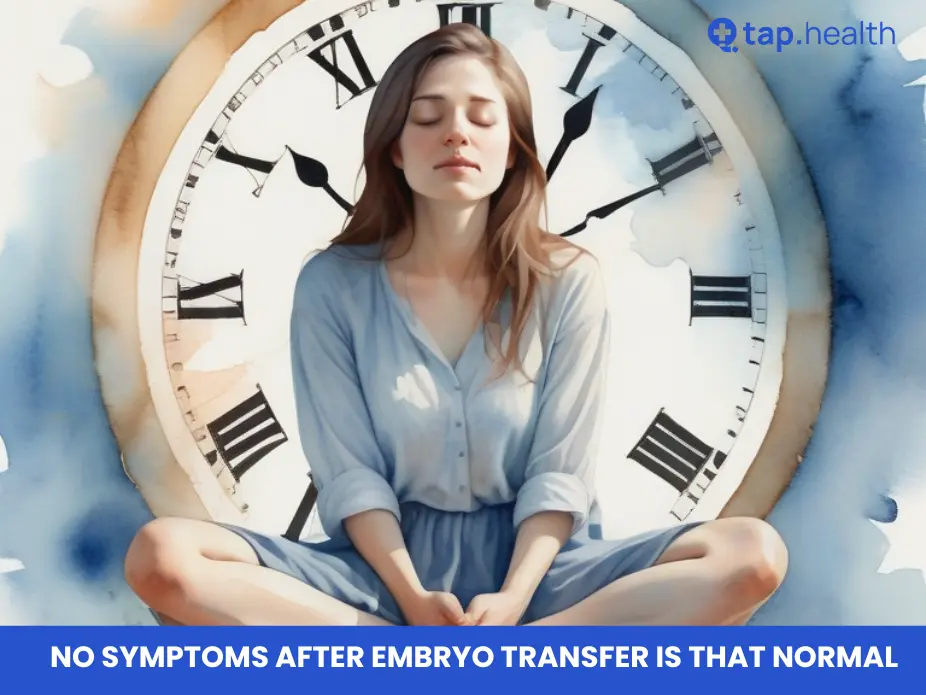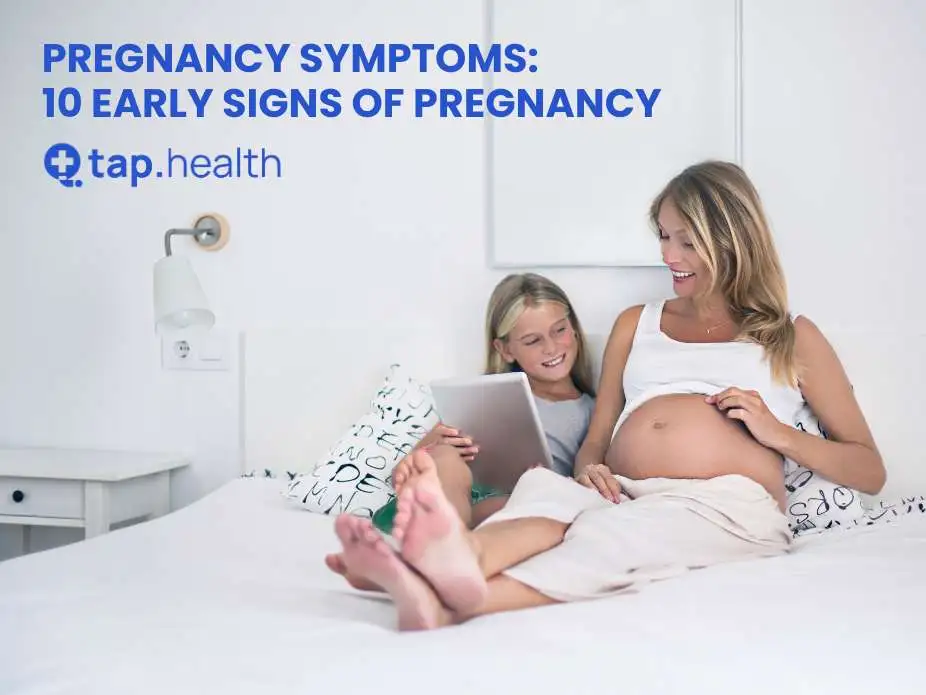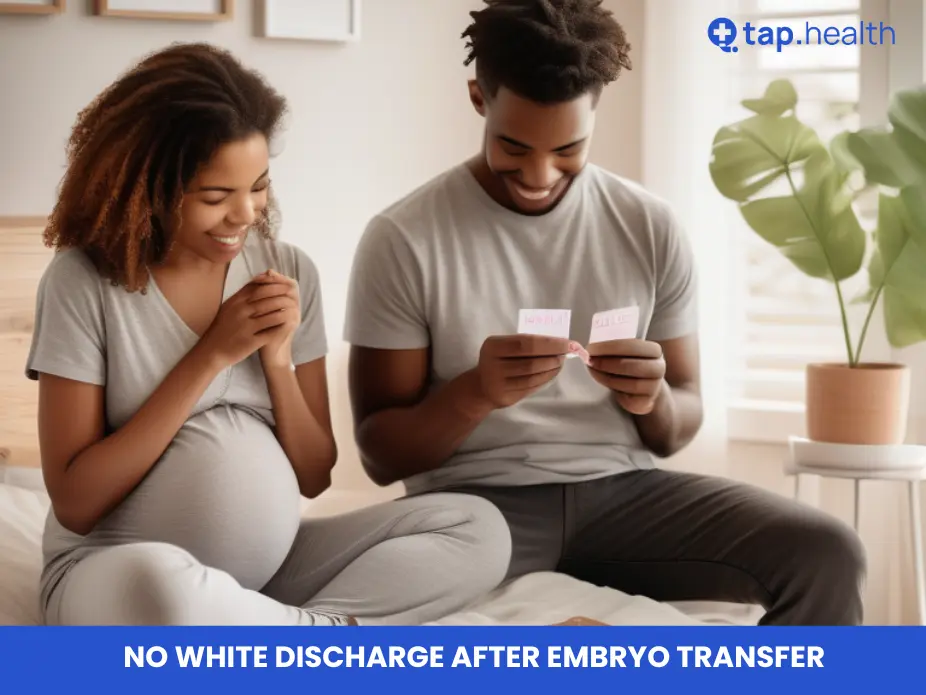The end of an IVF treatment is the embryo transfer. This step starts a waiting time for hopeful parents. It’s normal to feel anxious about early pregnancy symptoms. If you do not have any symptoms, it can be worrying. This article will help ease those worries. We will talk about how not having symptoms after embryo transfer is normal. We will look at different things that can happen during early pregnancy. We will also explain what having or not having symptoms could mean for your IVF treatment.
What is the Embryo Transfer Process
Embryo transfer is an important part of the in vitro fertilization (IVF) process. In this step, doctors carefully place embryos into the woman’s uterus. This happens after ovarian stimulation and egg retrieval. During egg retrieval, eggs are fertilized with sperm in a lab. The goal is to have a successful implantation, which can lead to pregnancy.
After the transfer, there is a waiting period of about two weeks. During this time, if the embryo has implanted successfully, it will start to grow and release pregnancy hormones like hCG.
The Role of Embryo Transfer in IVF Treatments
Embryo transfer is an important step in the IVF treatment process. It is the time when carefully grown embryos are placed in the woman’s uterus, where they can potentially grow. This step moves the process from lab work to a more natural phase.
The success of IVF treatment relies a lot on this transfer. If things go well, the embryo will attach to the uterine lining, starting early pregnancy. At this point, the embryo begins to divide and grow, leading to a positive pregnancy test and possibly the birth of a baby.
However, it’s important to know that just because embryo transfer happens, it doesn’t mean pregnancy will succeed. Many factors affect this, such as the quality of the embryo, how ready the uterus is, and the mother’s overall health.
Timeline of Expected Symptoms Post-Transfer
Every woman has her own experience, but here’s a basic timeline of possible symptoms after an embryo transfer:
Week 1:
- Implantation bleeding (Days 6-12): Some women may see light spotting or bleeding as the embryo attaches to the uterine lining. Not everyone will have this symptom.
- Mild cramping (Days 6-12): Mild cramps that feel like menstrual cramps can happen during implantation. This symptom can be different for each person.
Week 2:
- Breast tenderness (Days 10-14): Your breasts may feel sore and tender as hormone levels change. This is a common early pregnancy symptom.
- Other symptoms (Days 10-14): You might feel tired, notice a stronger sense of smell, have bloating, or experience mood swings. These can also happen because of the hormonal medications used during IVF.
Common Misconceptions About Post-Transfer Symptoms
One common misunderstanding about IVF is that women expect to feel strong pregnancy symptoms right after embryo transfer. This belief often comes from stories about pregnancy in society. Many women think they should notice changes quickly.
The truth is more complicated. Many women feel few or no symptoms after embryo transfer, especially in the first few days. It’s important to understand that not having symptoms does not mean the IVF cycle has failed.
The Myth of Immediate Pregnancy Symptoms
The belief that you will feel pregnancy symptoms right after an embryo transfer is more of a myth than facts. In the first few days after the procedure, there are often only small changes in hormones. Even though the embryo may be attaching and starting to grow, it takes time for hCG levels, the hormone checked in pregnancy tests, to increase enough to be seen.
Signs of early pregnancy, like nausea, breast tenderness, and tiredness, usually happen because of rising hCG levels. These symptoms often come later in the first trimester, usually around the time a period is missed, instead of right after the embryo transfer.
So it’s important to keep your expectations in check. Don’t worry too much if you don’t have any symptoms in the first days or weeks after the procedure. Patience is very important during this sensitive time.
Why Some Women Do Not Experience Symptoms
Several reasons explain why some women do not notice symptoms after embryo transfer. First, each woman’s body responds differently to hormone changes. Some women are more sensitive to these changes, showing clear early signs of pregnancy, while others might not feel much at all.
Second, the timing for implantation can be different. It can take a few days for the embryo to implant. Hormone levels then begin to rise slowly. Until hCG levels reach a specific level, regular pregnancy symptoms may not be easy to see.
Last, it’s essential to remember that many signs linked to early pregnancy can also be common side effects of IVF medications, like progesterone supplements. This makes it hard to tell apart the effects of the medicine from the actual early signs of pregnancy.
Evaluating the Significance of No Symptoms
The two-week wait after embryo transfer can seem very long. It can bring feelings of uncertainty and worry. It’s normal to want reassurance and to look for any signs that things went well. Still, it’s key to stay cautiously hopeful and not to overthink symptoms during this waiting period.
Focusing too much on how your body feels can be confusing and stressful. Instead of only depending on physical signs, prioritize self-care and emotional health. Also, keep open communication with your healthcare provider.
What Lack of Symptoms Could Mean for Your IVF Cycle
The lack of normal pregnancy symptoms does not always mean that your IVF cycle will end badly. It is important not to assume that not having symptoms means failure. Many women who succeed with IVF feel few or no symptoms in the beginning.
It is also important to remember that the hormones in IVF drugs, like progesterone, can imitate early pregnancy symptoms. So, if you don’t feel these symptoms, it might just be how your body reacts to the treatment, not a sign of a bad result.
In the end, the best way to know if your IVF cycle is successful is to take the pregnancy test at the time your doctor suggests. This test will give you a clearer answer than just paying attention to your body’s feelings.
When to Consult Your Doctor About Absence of Symptoms
While not having symptoms usually isn’t a big worry, there are times when you should talk to your IVF specialist. If you feel unusual or serious symptoms, like strong pelvic pain, heavy bleeding, or fever, it’s very important to contact your healthcare provider right away.
If you’re feeling anxious or stressed during the waiting period, don’t hesitate to ask your IVF team for emotional support. They can help with your worries and give you personalized advice.
Keep in mind that talking openly is very important during your IVF journey. Your medical team will be your main source of information and help during this time.
Positive Outcomes Despite No Symptoms
It’s important to know that many women who have had successful IVF often have few or no symptoms in early pregnancy. Not feeling symptoms doesn’t mean something is wrong. Many things play a role in how a woman feels during early pregnancy. So, the lack of symptoms doesn’t mean there is a problem with implantation or how the embryo is growing.
There are many stories of successful pregnancies where women didn’t have the typical early symptoms. These examples show us the need for patience, having realistic expectations, and trusting your body through its unique process.
Success Stories of Pregnancy Without Early Symptoms
Many couples find that not having noticeable symptoms in the weeks after an embryo transfer does not mean the implantation was not successful. One couple had tried for years to have a baby. After their first IVF cycle, the woman had very few symptoms, which made her feel anxious and worried. They were thrilled when the pregnancy test was positive, confirming that implantation had worked.
In another case, a woman who had IVF because of past fertility problems felt completely “normal” during her two-week wait. She had no signs of pregnancy and prepared herself for disappointment. To her joy, the pregnancy test showed a positive result. This demonstrated that a healthy IVF pregnancy can happen even without clear symptoms.
These stories show how early pregnancy can be unpredictable. Having few or no symptoms is not unusual and it doesn’t always mean a negative outcome. It’s important to manage expectations and talk to healthcare providers during this time.
Scientific Perspective on Symptomless Early Pregnancy
From a scientific view, early pregnancy symptoms mostly come from changes in hormones. This includes an increase in hCG, which is made by the growing placenta. However, when these hormonal changes happen and how strong they are can be very different for each woman.
Things like how sensitive a woman is to hormonal changes, when the embryo implants, and where it implants in the uterus can affect how early pregnancy symptoms are felt. Plus, many fertility clinics give progesterone supplements after an embryo transfer to help early pregnancy. This can make it hard for women to tell if they are having side effects from the medicine, like breast tenderness or tiredness, or if they are experiencing real pregnancy symptoms.
Experts say that it is common not to have clear symptoms in the first weeks after an embryo transfer. They suggest patients should trust tests done by skilled healthcare providers at their fertility clinic, like blood tests and ultrasounds, to check how their IVF cycle is progressing.
Navigating the Two-Week Wait After Embryo Transfer
The time after embryo transfer can be stressful and full of feelings. Many people call it the “two-week wait.” During this time, you are waiting for the pregnancy test. You might feel excited and nervous at the same time. Even small feelings in your body may make you wonder if you are pregnant or not.
You are not alone. It’s important to reach out to people who support you. Take care of yourself and do things you enjoy to help relax. Believe in your body and how it works. It’s key to focus on your emotions while you wait for the test results.
Tips for Managing Anxiety During This Period
Managing anxiety during the waiting period is very important in the IVF journey. Here are some tips to help you through this tough time:
- Distract Yourself: Do things you love and that relax you. Try reading, watching movies, spending time outside, or visiting with friends and family. Keeping busy can help take your mind off worries.
- Practice Relaxation Techniques: Try deep breathing, meditation, yoga, or mindfulness. These can reduce stress and create a feeling of calm. They are especially helpful when your anxiety is high.
- Seek Support: Talk to people who care about you. This includes your partner, family, friends, or a therapist. Sharing your thoughts and worries can be comforting. Just talking about how you feel can lift some of the emotional weight off your shoulders.
The Importance of Emotional Support
The importance of emotional support during fertility treatment, especially IVF, is very clear. This journey can be tough on both your body and mind. It often feels uncertain too. Having a strong support system, which can be your partner, family, friends, or a support group, can really help.
The two-week wait after embryo transfer is a time when emotional support is even more important. The worries and hormonal changes can raise feelings of anxiety and stress. Talking about your feelings, fears, and hopes with someone who understands can help you feel better and more at ease.
It’s important to know that asking for support shows strength, not weakness. Many couples dealing with infertility find comfort in connecting with others who have gone through the same thing. Support groups offer a safe place to share experiences, find ways to cope, and work through the emotions of IVF together.
Frequently Asked Questions on No Symptoms After Embryo Transfer: What’s Normal?
1.Is it normal not to feel any symptoms after an embryo transfer?
Yes, it is completely normal. Not having any embryo transfer symptoms is a common sign and does not mean there is a problem. Many women feel no clear symptoms after the IVF procedure but still have successful pregnancies.
2.How long should I wait to take a pregnancy test after embryo transfer?
After your embryo transfer, your fertility clinic will tell you when to take a pregnancy test. It is usually best to do this about 10 to 14 days later. This gives enough time for hCG levels to increase so that the blood test results can be more accurate.
3.Can lack of symptoms still result in a successful pregnancy?
The lack of common early pregnancy symptoms does not mean IVF has failed. Many women have a successful pregnancy even when they don’t have those usual signs. This is because pregnancy hormones and each woman’s experience can be very different.
References
American Society for Reproductive Medicine. (n.d.). Understanding IVF. Retrieved from https://www.asrm.org
Fertility Network UK. (n.d.). Coping with the Two-Week Wait. Retrieved from https://fertilitynetworkuk.org


